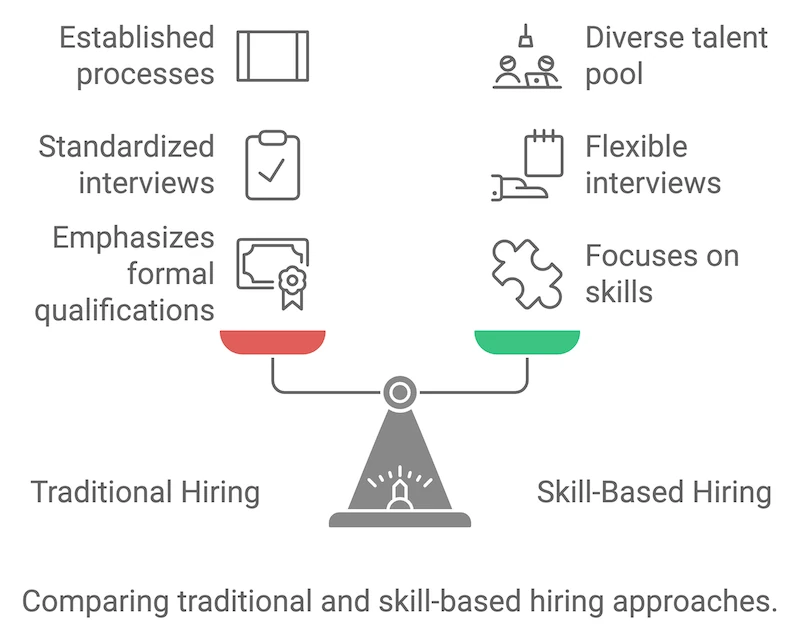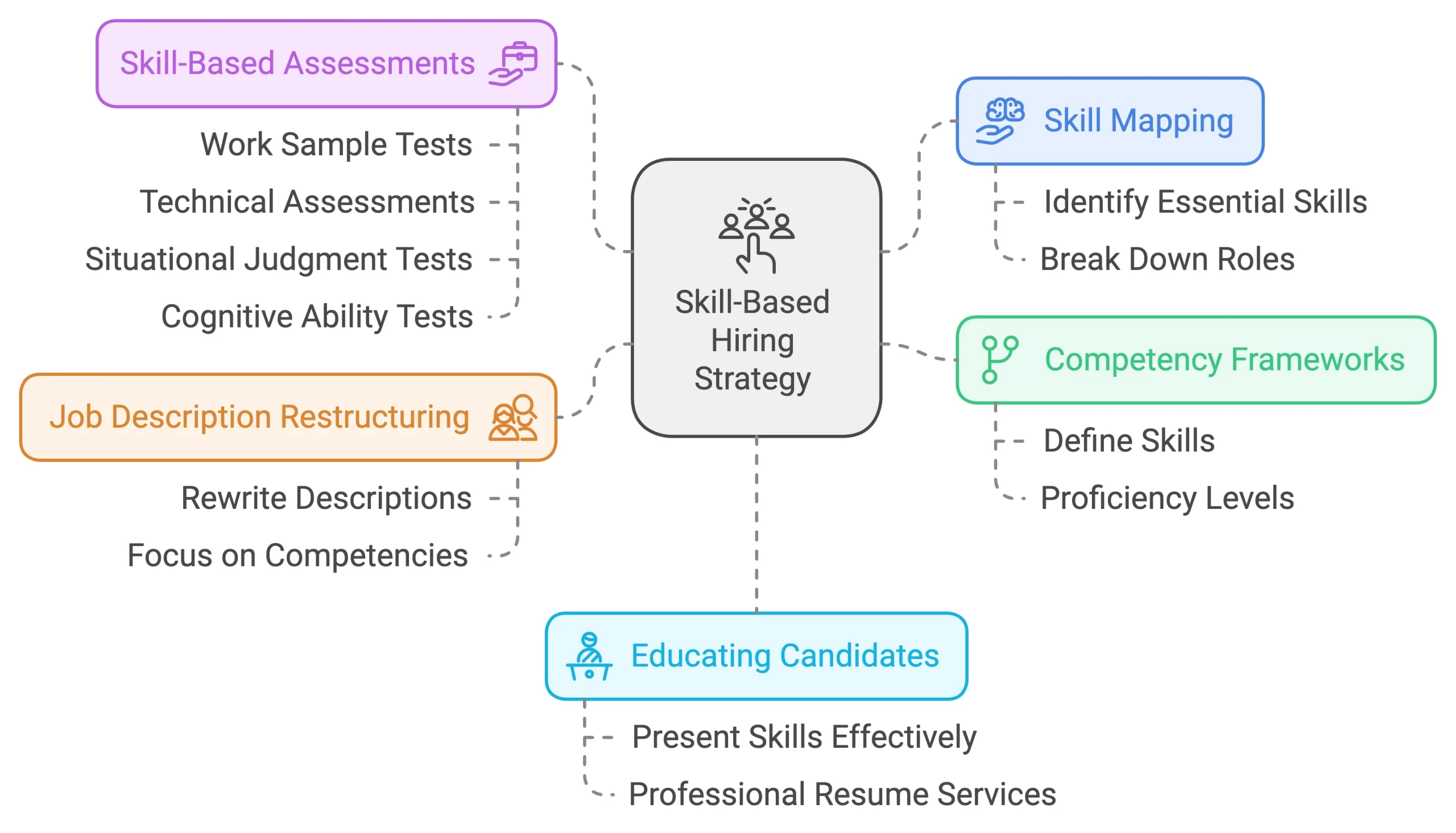In today’s rapidly evolving job market, traditional hiring methods are increasingly falling short. Enter skill base hiring – a revolutionary approach that’s changing the game for recruiters and organizations worldwide. But what exactly is it, and how can it benefit your organization?
In this comprehensive guide, we’ll explore the ins and outs of this innovative recruitment strategy, while also providing you with actionable steps to implement it in your organization.

What is Skill Base Hiring? Definition and Key Principles
Skill base hiring is a recruitment approach that focuses on a candidate’s actual abilities and competencies rather than relying solely on traditional credentials like degrees or years of experience. This method evaluates candidates based on their demonstrated skills and potential to perform specific job functions.
Key Principles of Skills-Based Hiring:
- Focus on Competencies: Prioritize specific skills required for job success.
- Objective Assessment: Use standardized methods to evaluate competencies.
- Potential Over Pedigree: Value a candidate’s capabilities and growth potential.
- Continuous Skill Development: Emphasize ongoing learning and adaptability.
Benefits of Implementing Skills-Based Hiring in Your Organization
Adopting this approach leads to numerous advantages, which include the following:
- Improved Job Fit: By focusing on specific skills required for a role, you’re more likely to find candidates who will hit the ground running.
- Reduced Bias: Skills-based assessments provide objective data, helping minimize unconscious biases in the hiring process.
- Increased Diversity: Looking beyond traditional qualifications allows you to tap into a wider, more diverse talent pool.
- Better Performance: Employees hired based on their skills are often more productive and engaged in their roles.
According to a recent HR Industry Report, organizations implementing skill-based hiring have seen a 25% improvement in employee retention rates. Additionally, a study by the Corporate Leadership Council found that companies using these techniques experienced a 20% increase in workforce productivity.

How to Develop a Skill-Based Hiring Strategy
To successfully implement this innovative strategy, focus on the following key components:
1. Skill Mapping for Roles
Identify the essential skills required for each position in your organization. Break down roles into specific, measurable competencies.
2. Competency Frameworks
Develop a clear, organization-wide framework that defines various skills and proficiency levels. This ensures consistency in how skills are evaluated across different roles and departments.
3. Job Description Restructuring
Rewrite your job descriptions to focus on required skills and competencies rather than years of experience or specific qualifications. This helps attract a more diverse range of candidates and sets clear expectations for the role.
4. Implement Skill-Based Assessments
Develop and integrate assessments that effectively measure the skills crucial for job success:
- Work Sample Tests: Simulate actual job tasks.
- Technical Assessments: Evaluate specific technical abilities.
- Situational Judgment Tests: Assess decision-making skills in job-related scenarios.
- Cognitive Ability Tests: Evaluate problem-solving and learning ability.
5. Educate Candidates on Skill-Based Applications
As organizations shift toward skill-based hiring, it’s crucial to help candidates understand how to present their abilities effectively. Encourage applicants to focus on their relevant skills and achievements in their applications. This may involve guiding them to restructure their resumes and cover letters to highlight specific competencies rather than just work history or educational background. By providing clear guidelines on what you’re looking for, you help ensure that candidates submit applications that align well with your hiring approach, making the selection process more efficient and effective.
The World Economic Forum’s Future of Jobs Report highlights that 50% of all employees will need reskilling by 2025, emphasizing the importance of focusing on adaptable skills rather than fixed qualifications.

Overcoming Challenges in Skill-Based Hiring Implementation
While skills-based hiring offers numerous benefits, it’s not without its challenges. Here’s how to address some common hurdles:
1. Address Potential Biases
Regularly review your assessment methods for any unintended discrimination and consider using blind evaluation techniques where possible.
2. Manage Time and Resource Investment
Start small by focusing on key roles or departments, and gradually expand your approach.
3. Gain Stakeholder Buy-In
Educate hiring managers and executives on the benefits of skill base hiring. Use data and case studies to demonstrate its effectiveness in improving hiring outcomes.
Measuring the Impact of Your Skill Base Hiring Approach
To ensure your skill base hiring strategy is effective, track these key performance indicators (KPIs):
- Time-to-productivity for new hires
- Employee performance ratings
- Retention rates
- Diversity metrics
- Hiring manager satisfaction
Regularly gather feedback from hiring managers, new hires, and recruiters to continuously refine your approach.
Transform Your Workforce with Skill Base Hiring
As the nature of work continues to evolve rapidly, skill-based hiring offers a forward-thinking approach to building a talented, adaptable workforce. By focusing on candidates’ actual abilities rather than proxies for skills, you create a more diverse, productive, and engaged team.
Remember, transitioning to skill base hiring is a journey. Start by assessing your current hiring practices and identify areas where you can incorporate skill-based techniques. Even small changes, such as restructuring job descriptions or introducing work sample tests, can have a significant impact on your hiring outcomes.
By embracing skill base hiring, you’re not just filling positions – you’re building the foundation for a more capable, innovative, and successful organization. The future of work is skills-based, and it’s crucial for both employers and job seekers to adapt.
For candidates looking to showcase their skills effectively in this new hiring landscape, our professional resume writing services can help create compelling, skill-focused resumes that align perfectly with skill base hiring practices. Whether you’re an organization implementing this new approach or a job seeker looking to stand out, focusing on skills is key to success in the modern job market.
Is your organization ready to revolutionize its hiring process? The time to embrace skill base hiring is now!








